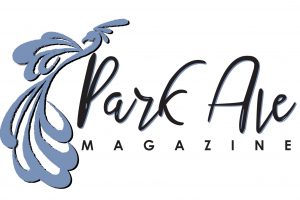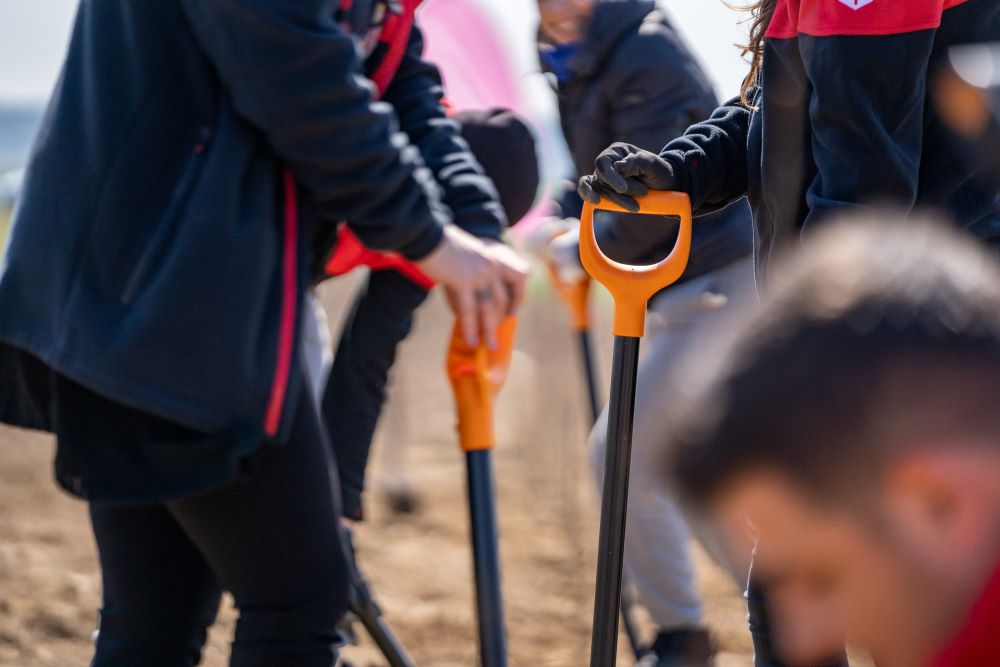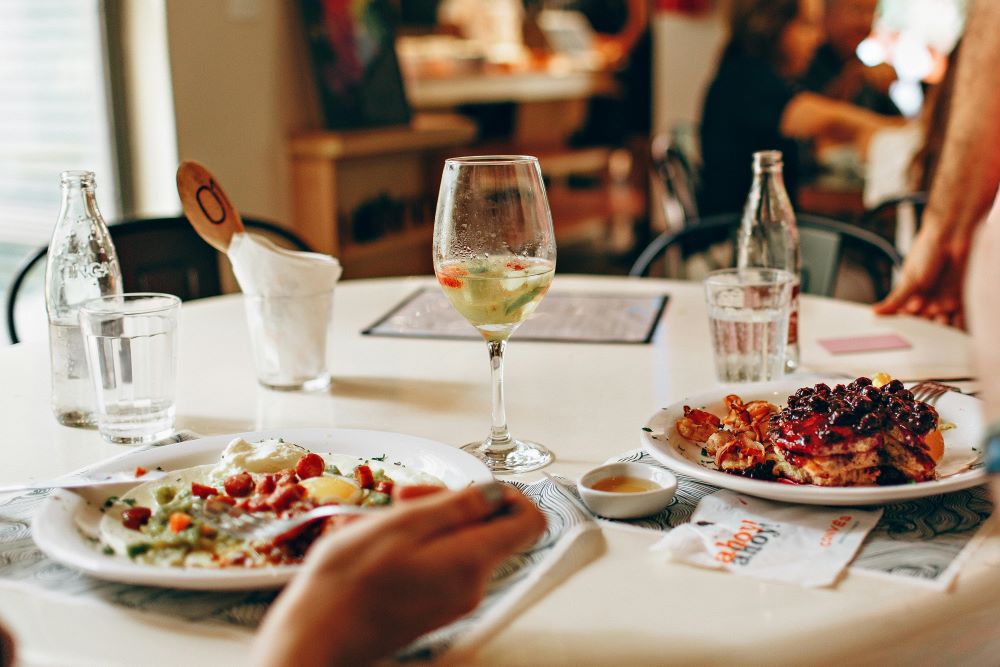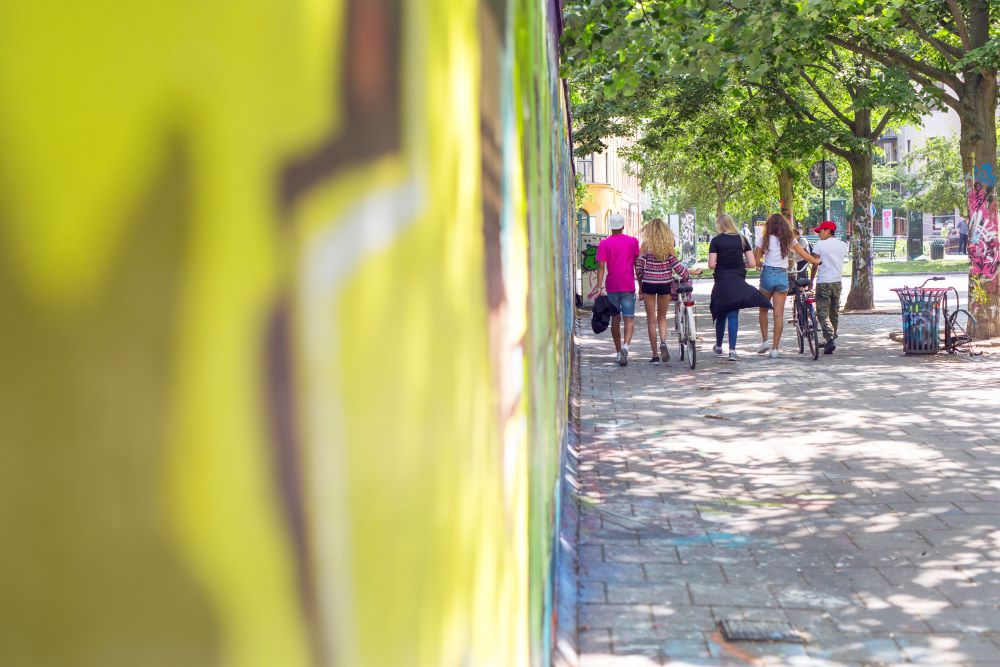In this special feature of Park Ave Magazine, our writers got to get up close and personal with Marci Duncan and Kerry Sandell – the playwrights and actors of “Dissonace” – a raw, honest play about race, love and relationships. You’ll want to stick around for this interview.
What Is “Dissonance”?
Dissonance prompts a question: Can a black woman and a white woman have an honest, civil, and candid discussion about race? Can a friendship survive the brutal honesty of differing experiences?
In ‘Dissonance”, Angela and Lauren have been friends for more than 20 years. They met in graduate school, became godmothers to each other’s children, and are now starting a new business. As they open their cafe in a historic black neighborhood in Pensacola, Florida, they uncover deeply-held perceptions that threaten to dismantle their friendship.
The play takes place on the heels of summer 2020, and is a heart-warming conversation that explores the national hurt following George Floyd’s murder and how it impacts both black and white American women.
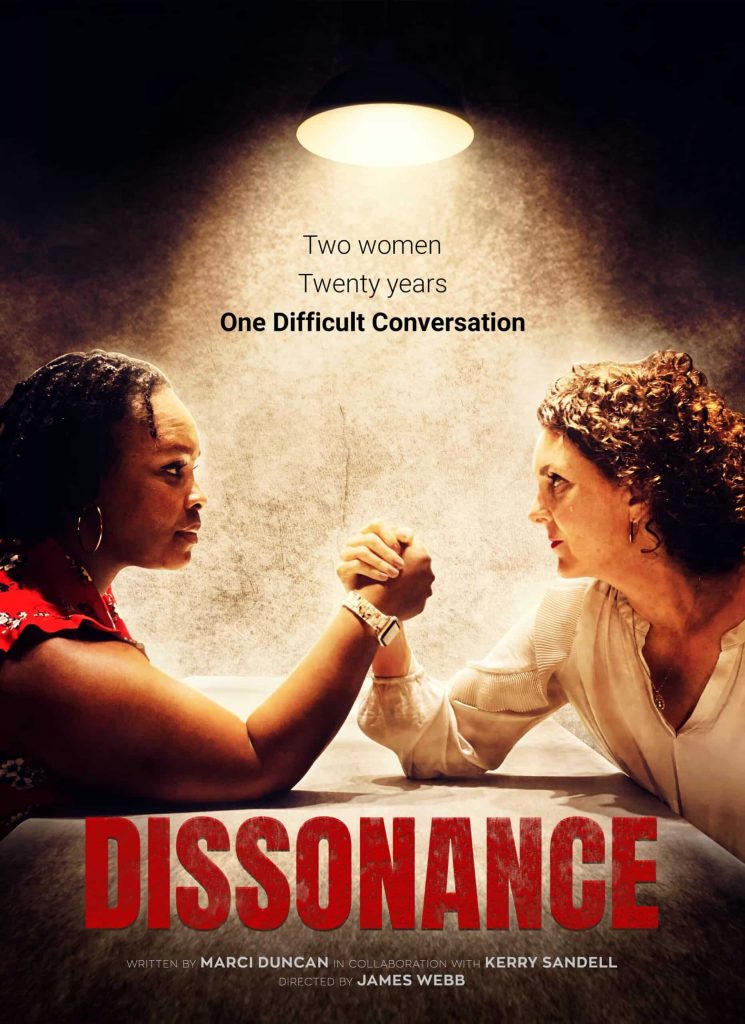
Interview with Marci Duncan and Kerry Sandell
Park Ave Magazine: So, tell us a little more about Dissonance!
Marci: “I would just like to say that Dissonance was written from a place of love and ultimately Dissonance is about love – how do we lead with love to ultimately get us to a place of unity. Especially between people who are not the same culturally, how do we get to a place of unity where we can see each other really, really see each other and appreciate one another without devaluing their particular experience, or culture, or race, right? And so these two ladies in this play are forced to figure that out because they love one another and that’s one of the things that I love about the play. It’s about Unity. Not division. Not separation. But about Unity.
Kerry: “I agree with that. And certainly if you looked around a little bit and our social media A little bit like encourage you to do so, because there’s a lot on there. But you do see this play is about how can two women who have been friends for 20 years, have a conversation about race and can their friendship survive? And these two, women have been in relationships with one another have been friends. Best of friends, for 20 years but there are elephants in the room that they’ve avoided and that happens, you know, sometimes there’s just things in relationships where we tell ourselves “I’m just not going go there. But what that’s done is, it’s allowed their friendship to, to be anemic. So, we explore that.”
“It is interesting because dissonance Is what the relationship is going through. But the play is about Unity, so that dichotomies is great and it has been very unifying and a very rewarding experience as we’ve taken this play from its from its Genesis and its first production at FAMU almost a year ago to Across the Panhandle to the Bronx to Washington DC. We were there for two weeks and now we’re coming to Central Florida and Marcy and I both have spent a good part of our lives in Central Florida so it’s fantastic to bring it back.
Park Ave Magazine: Tell us more about the friendship between the two characters.
Marci: “It is a fictional story but the story has a lot of real life elements included into the story. The way that the story came about was it I was doing a show in and Destin at Emerald Coast Theater Company and Kerri came to see a production that I was in. Before that, Kerri and I were associates. We had a lot of respect for one another, but I wouldn’t say we had a friendship that is displayed in the play, but we certainly knew each other and had great respect for one of one another, but after the show was over Carrie came and asked if she could talk to me. And of course, this was during the time the climate of George Floyd and social unrest, and people were really displaying their frustration with this murder during that time and I was I was suffering during that time. I was trying to make sense of it during that time. And so, Kerri came to me and she said, can I talk to you? You know, she said, “I know we both had Sons around the same age, they’re both of, you know, in their 20s. And I am interested to know the things that you’re having to tell your son right now versus the things that I’m having to tell my son. I know that they’re different, and I’m interested to talk to you about that. And furthermore, I want to understand, I want to understand those differences, and I feel like we should write a play about it.”
“And honey, that thing struck me, so, and I was immediately inspired and I was taken aback and because that had never happened to me, you know, a woman of the opposite race – a white woman asking to talk to me about something, so race-specific. But the way that she approached me was 100% in love and I try to lead in love in my life. It doesn’t always work that way but I try so, you know, something in me recognized something in her and it didn’t allow me to be defensive or suspicious.”
“I was open, I was open and the rest is history. We started meeting, we started talking, she had questions, I had questions. You know, we started to really get into the conversation about race about where my race hurt had come from. What her experience with race was, and we started to really peel back some very vulnerable layers, and that’s when our friendship really was solidified. I mean, it went from 0 to 60 and we developed this beautiful respect for one another relationship. And once we started talking about all of that and flushing that out that started talking about what the play is going to be about. Now, we have an understanding. Let’s talk about what the play is going to be about and then we just did it. It’s really I can’t say that I’ve been through a process any process like this in my life. First of all, I did not know that a play was on the inside of me and second I did not know that it would resonate so many people so it the story does have some truthful elements. Some of the monologues in the story, some of the discussions are real discussions that I’ve had with other people or you know, a situation that I talked about. One of the monologues that I talked about in the in the play is a real situation that happened to my son.
“So there are some truthful elements but the story is mainly predominantly fictional as far as the way that these characters are in relationship and they’re building this Cafe and they’ve been friends for 20 years, that part is absolutely fictional
Kerry: “It was an interesting process because we started this during lockdown, everything was locked down. So we started having these Zoom meetings and having these conversations about it and opening up a Google. Falcon. Getting the world’s largest Google doc. Exploring all of these issues and it created this safe space. That was really interesting because we had time to process. We had to, I had to think about it. We have enough. Safety built into it that we could ask questions that maybe we might not feel free of comfortable to ask in person or answer in person or might couch it in a certain way. So, you know, still still keeping up a pretense of, you know, I’m exploring this, but I’m not really going there. It allowed us to go there. So we talked about our first awareness of race as children and what came of that. We talked about all of these issues that we talked about in the play and because of that, you know, we started with, hey, I’m going to screw up, you’re going to screw up, but let’s try to understand one another. And let’s agree that, you know, anytime we say something offensive and unintentionally or we don’t have an understanding, we do have the be agreement and understanding that we’re we’re approaching this and love, like Marcy said, so it made further Interesting creative process and it was very, very freeing because we didn’t feel like we couldn’t be honest.
Park Ave Magazine: So when you came together, like that, nothing was off-limits. You were just totally open with each other, right?
Marci: “Right. We didn’t, we didn’t have any borders or barriers because we didn’t know that we should put any up because she approached me very specifically and, and very clearly. And so it was like, you know, like I said, you know, I could intimate that her intentions were good and so it totally disarmed borders or things that I would normally put up with the conversation like that. And so the writing process was like, I started to write immediately when I went home that night, after she approached me and we had a discussion after the play immediately, I went home and I just started to write and I wrote one of the monologues that’s in the play, a pivotal monologue in the play because I was just so inspired. And like I said, I had no idea that this stuff was on the inside of me and wanted to come out in this way. But because I was inspired, it came to the surface and so We started the planning process, we started to write, we talked a lot before we even wrote anything down, in terms of structure. And so before we even started to flesh that out and talked a lot, and then after we talked, and we hashed out the skeleton of it, at their show of the Play Kerri faced a life situation that she had to attend to and I said okay don’t worry, I got you so I just started to write some of the things that were inside and honey it just poured out it just kind of poured out and then I punted it take to Kerri and she put some meat on that thing to and said okay what I would say it like this or this would be my real response. And then we punted it back and we started to really look at it and say, okay, this is starting to really take shape. Let’s get it to somebody. Let’s get it to somebody, so Kerry gave it to a trusted friend to read it. Dramaturgical speaking, and I gave it to a trusted friend to read, dramaturgical, speaking and we got feedback and the feedback was this good, you know, we need a little bit of this and a little bit of that, but this This meat is good, and so, we started taking the advice and the feedback and make the adjustments to the script and then we put it on its feet and we worked it out. We put it on its feet, we read it together with our director James Webb and he started to ask us even more difficult questions and started to highlight what we want necessarily being as honest, as we thought we were.”
Kerri: “And that was interesting because we were so convinced that because of the way our process was it was like “I’m being you know I’m being completely vulnerable here” and then he would read to a part of the script. Any be like I hear what you’re saying but that’s not really what you’re saying. Is it hang it even when we think, you know, and that’s just so built into our culture’s and into society and and everything else is there. So there are these things that you just don’t? So that vulnerability then and and him pinpointing moments worth like yeah you’re just saying that but what he really will you really trying to say what do you really mean by that? It really exposed a lot more and us and so it’s reaped incredible Awards though because of how its resonated with audiences in very diverse demographics and you know geologic geographically as well as racial and age demographics, you know, just very diverse the response. Above and beyond above, and beyond every single time has been very, very positive, very real farming and so many people have said, “Everybody needs to see this.” So many people have said “Please bring it to our community. so we hope as many people as possible can come see it. We really, really want as many people as possible to be able to come and see it because it is not entertainment. It is a play that does good and it engages in conversation that brings Unity.”
Marci: “There is no preaching to people. We’re not telling them what they should do. There is no villainizing, one group or another group, it is totally not about that. It’s about how these two women figure it out together and letting people know that it’s worth the work. It is worth the work.
Kerri: “I think that was some of it was during that time when we first began this process, everything is so politicized. You know, at the height of the summer 2020 and then the months following that you could not get on social media or media, without the, the spin being one way or another. Without it being very divisive and politicized. I don’t think that in general, that’s necessarily the truth of most of us. No, we are seeking human connection and relationships, and understanding, and unity by, and large. We’re not all on our platforms with our agendas and our politicized views. This is not a political issue. It’s a human issue. It’s a heart issue.
Park Ave Magazine: What are some of the differences in the way different demographics reacted to the play?
Marci: “Mostly, every time we’ve done the show, people are saying “It’s just so real. I felt like I was there”, or they’re saying “that’s exactly how I felt right?” Or, you know, I had that same conversation” And I think that is Testament to how we created the piece because it was very much “How would you respond?” It was very much. Okay, how do you feel about what she just said? The language and the dialogue is very authentic, very organic. So I think people in all of our audiences gravitate to how real it is. I don’t think there’s anything left unsaid in terms of, you know, the parameters at which these ladies have this conversation. If there’s a response, the character says it and says it pretty bluntly, right? And the other thing, too, that a lot of people say is that they believed that we were friends. The dynamic between Kerri and myself and, or Lauren and Angela was so real and organic. And somebody says that, at least every performance.”
Kerri: “I think it’s been universally embraced, and positively received. It’s interesting as a performer. You always feel a difference in every audience and every show. It doesn’t matter what it is. And this one in particular because it’s, it’s so raw and, and authentic, and honest, I think we definitely feel that, but it’s interesting, like the DC audiences and the New York audiences always say “So, what’s it like in the South?” like they’re expecting a lot of people who didn’t want to have a talk about race and that has been the case that all we performed. You know, there are certain areas where in Pensacola and their communities outside of Pensacola that are very historically rural.
“And we’ve had, we had a gentleman at one of our shows that was in his mid-50s that a white man that came up to us after one of the shows in Pensacola and said, I got some thinking to do. I’ve never thought about it this way and that is an award that can’t compare to, right? I do feel that it hit different, maybe for in particular, the DC audience because Experience with the protest with the civil unrest in the city was very very different than we experienced in Florida. And so I still a lot of raw feelings and emotions and things that they will processing. Having said that we’ve still wonderfully and beautifully received, we’ve never had anybody come up and say anything like “I didn’t like what you were trying to say”. The only remotely negative comment, we got was somebody saying “I loved this. This is beautiful but that’s not what happened with me and my friend, our friendship ended but that, you know, I mean, that just goes to show you, there’s work to be done. And then we all are on this journey of understanding one another together.
Park Ave Magazine: Definitely. Overall, what is the message that you hook viewers get from this and how do you want them to feel after they see it.
Kerri: Well, I want them to feel hopeful once you’re hopeful when they leave our show that Unity is possible and it is worth the work because it is work that you have to put in to getting to a place of unity. So I want them to feel hopeful. I want them to see How it could be done, how it could be achieved, you know, these two characters show you a way in which they do it. And hopefully, that can provide a way in which it can be done. And I think the way that they are able to achieve it is that they default on the fact that they love one another and that that love is something that supports them. As they work it out, and they can always come back to that. Yeah.
Learn More About “Dissonance”
Learn more about “Dissonance” by visiting www.dissonanceplay.com where you can order tickets and make a donation. You can also follow them on Facebook, Instagram and TikTok.
Keep Up with Dining, Events, Entertainment and News in Orlando
At Park Ave Magazine, we are your guide to Winter Park and beyond. We are showcasing the “casual” side of Winter Park, FL and all it has to offer. You can submit articles and submit events to Park Ave Magazine. Are you interested in expanding your business in Orlando? Contact us about advertising opportunities. We look forward to hearing from you!
